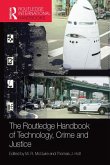Routledge Handbook of Science, Technology, and Society
Herausgeber: Kleinman, Daniel Lee; Moore, Kelly
Routledge Handbook of Science, Technology, and Society
Herausgeber: Kleinman, Daniel Lee; Moore, Kelly
- Broschiertes Buch
- Merkliste
- Auf die Merkliste
- Bewerten Bewerten
- Teilen
- Produkt teilen
- Produkterinnerung
- Produkterinnerung
The Routledge Handbook of Science, Technology and Society seeks to capture the dynamism and breadth of the STS field by presenting work which pushes the reader to think about science and technology and their intersections with social life in new ways.
Andere Kunden interessierten sich auch für
![The Routledge Handbook of Technology, Crime and Justice The Routledge Handbook of Technology, Crime and Justice]() The Routledge Handbook of Technology, Crime and Justice47,99 €
The Routledge Handbook of Technology, Crime and Justice47,99 €![Science, Technology, and Art in International Relations Science, Technology, and Art in International Relations]() Science, Technology, and Art in International Relations64,99 €
Science, Technology, and Art in International Relations64,99 €![The Routledge Handbook of Male Sex Work, Culture, and Society The Routledge Handbook of Male Sex Work, Culture, and Society]() The Routledge Handbook of Male Sex Work, Culture, and Society62,99 €
The Routledge Handbook of Male Sex Work, Culture, and Society62,99 €![Science, Technology, and Society Science, Technology, and Society]() Science, Technology, and Society44,99 €
Science, Technology, and Society44,99 €![Science, Technology, Policy and International Law Science, Technology, Policy and International Law]() Science, Technology, Policy and International Law142,99 €
Science, Technology, Policy and International Law142,99 €![The Routledge Handbook of British Politics and Society The Routledge Handbook of British Politics and Society]() The Routledge Handbook of British Politics and Society68,99 €
The Routledge Handbook of British Politics and Society68,99 €![The Routledge Handbook of Visual Impairment The Routledge Handbook of Visual Impairment]() The Routledge Handbook of Visual Impairment62,99 €
The Routledge Handbook of Visual Impairment62,99 €-
-
-
The Routledge Handbook of Science, Technology and Society seeks to capture the dynamism and breadth of the STS field by presenting work which pushes the reader to think about science and technology and their intersections with social life in new ways.
Hinweis: Dieser Artikel kann nur an eine deutsche Lieferadresse ausgeliefert werden.
Hinweis: Dieser Artikel kann nur an eine deutsche Lieferadresse ausgeliefert werden.
Produktdetails
- Produktdetails
- Routledge International Handbooks
- Verlag: Taylor & Francis Ltd
- Seitenzahl: 542
- Erscheinungstermin: 18. April 2019
- Englisch
- Abmessung: 246mm x 174mm x 29mm
- Gewicht: 946g
- ISBN-13: 9780367335939
- ISBN-10: 036733593X
- Artikelnr.: 56923965
- Herstellerkennzeichnung
- Libri GmbH
- Europaallee 1
- 36244 Bad Hersfeld
- gpsr@libri.de
- Routledge International Handbooks
- Verlag: Taylor & Francis Ltd
- Seitenzahl: 542
- Erscheinungstermin: 18. April 2019
- Englisch
- Abmessung: 246mm x 174mm x 29mm
- Gewicht: 946g
- ISBN-13: 9780367335939
- ISBN-10: 036733593X
- Artikelnr.: 56923965
- Herstellerkennzeichnung
- Libri GmbH
- Europaallee 1
- 36244 Bad Hersfeld
- gpsr@libri.de
Daniel Lee Kleinman is Associate Dean for Social Studies at the Graduate School and Professor in the Department of Community and Environmental Sociology at the University of Wisconsin-Madison. Kelly Moore is Associate Professor of Sociology at Loyola University-Chicago.
Introduction Part I: Bodies 1. The Emergence, Politics, and Marketplace of
Native American DNA 2. Technoscience, Racism, and the Metabolic Syndrome 3.
Standards as 'Weapons of Exclusion': Ex-Gays and the Materialization of the
Male Body 4. Curves to Bodies: The Material life of Graphs Part II:
Consuming Technoscience 5. Producing the Consumer of Genetic Testing: The
Double-Edged Sword of Empowerment6. The Social Life of DTC Genetics: The
Case of 23andMe 7. Cultures of Visibility and the Shape of Social
Controversies in the Global High-tech Electronics Industry 8. The Science
of Robust Bodies in Neoliberalizing India Part III: Digitization 9. Toward
the Inclusion of Pricing Models in Sociotechnical Analyses: The SAE
International Technological Protection Measure 10. The Web, Digital
Prostheses, and Augmented Subjectivity 11. Political Culture of Gaming in
Korea amid Neoliberal Globalization12. Cultural Understandings and
Contestations in the Global Governance of Information Technologies and
Networks Part IV: Environments 13. Green Energy, Public Engagement and the
Politics of Scale 14. Political Scale and Conflicts over Knowledge
Production: The Case of Unconventional Natural Gas Development 15. Not Here
and Everywhere: The Non-Production of Scientific Knowledge 16. Political
Ideology and the Green-Energy Transition in the United States 17. Risk
State: Nuclear Politics in an Age of Ignorance 18. From River to Border:
The Jordan between Empire and Nation-State 19. State-Environment
Relationality: Organic Engines and Governance Regimes Part V: Technology
Science Work 20. Invisible Production and the Production of Invisibility:
Cleaning, Maintenance, and Mining in the Nuclear Sector 21. Social
scientists and humanists in the health research field: A clash of epistemic
habitus 22. Women in the Knowledge Economy: Understanding Gender Inequality
through the Lens of Collaboration23. The Utilitarian View of Science and
the Norms and Practices of Korean Scientists 24. Science as Comfort: The
Strategic Use of Science in Post-Disaster Settings Part VI: Rules and
Standards 25. Declarative Bodies: Bureaucracy, Ethics and
Science-in-the-Making 26. Big Pharma and Big Medicine in the Global
Environment 27. On the Effects of E-Government on Political Institutions
28. Science, Social Justice and Post-Belmont Research Ethics: Implications
for Regulation and Environmental Health Science
Native American DNA 2. Technoscience, Racism, and the Metabolic Syndrome 3.
Standards as 'Weapons of Exclusion': Ex-Gays and the Materialization of the
Male Body 4. Curves to Bodies: The Material life of Graphs Part II:
Consuming Technoscience 5. Producing the Consumer of Genetic Testing: The
Double-Edged Sword of Empowerment6. The Social Life of DTC Genetics: The
Case of 23andMe 7. Cultures of Visibility and the Shape of Social
Controversies in the Global High-tech Electronics Industry 8. The Science
of Robust Bodies in Neoliberalizing India Part III: Digitization 9. Toward
the Inclusion of Pricing Models in Sociotechnical Analyses: The SAE
International Technological Protection Measure 10. The Web, Digital
Prostheses, and Augmented Subjectivity 11. Political Culture of Gaming in
Korea amid Neoliberal Globalization12. Cultural Understandings and
Contestations in the Global Governance of Information Technologies and
Networks Part IV: Environments 13. Green Energy, Public Engagement and the
Politics of Scale 14. Political Scale and Conflicts over Knowledge
Production: The Case of Unconventional Natural Gas Development 15. Not Here
and Everywhere: The Non-Production of Scientific Knowledge 16. Political
Ideology and the Green-Energy Transition in the United States 17. Risk
State: Nuclear Politics in an Age of Ignorance 18. From River to Border:
The Jordan between Empire and Nation-State 19. State-Environment
Relationality: Organic Engines and Governance Regimes Part V: Technology
Science Work 20. Invisible Production and the Production of Invisibility:
Cleaning, Maintenance, and Mining in the Nuclear Sector 21. Social
scientists and humanists in the health research field: A clash of epistemic
habitus 22. Women in the Knowledge Economy: Understanding Gender Inequality
through the Lens of Collaboration23. The Utilitarian View of Science and
the Norms and Practices of Korean Scientists 24. Science as Comfort: The
Strategic Use of Science in Post-Disaster Settings Part VI: Rules and
Standards 25. Declarative Bodies: Bureaucracy, Ethics and
Science-in-the-Making 26. Big Pharma and Big Medicine in the Global
Environment 27. On the Effects of E-Government on Political Institutions
28. Science, Social Justice and Post-Belmont Research Ethics: Implications
for Regulation and Environmental Health Science
Introduction Part I: Bodies 1. The Emergence, Politics, and Marketplace of
Native American DNA 2. Technoscience, Racism, and the Metabolic Syndrome 3.
Standards as 'Weapons of Exclusion': Ex-Gays and the Materialization of the
Male Body 4. Curves to Bodies: The Material life of Graphs Part II:
Consuming Technoscience 5. Producing the Consumer of Genetic Testing: The
Double-Edged Sword of Empowerment6. The Social Life of DTC Genetics: The
Case of 23andMe 7. Cultures of Visibility and the Shape of Social
Controversies in the Global High-tech Electronics Industry 8. The Science
of Robust Bodies in Neoliberalizing India Part III: Digitization 9. Toward
the Inclusion of Pricing Models in Sociotechnical Analyses: The SAE
International Technological Protection Measure 10. The Web, Digital
Prostheses, and Augmented Subjectivity 11. Political Culture of Gaming in
Korea amid Neoliberal Globalization12. Cultural Understandings and
Contestations in the Global Governance of Information Technologies and
Networks Part IV: Environments 13. Green Energy, Public Engagement and the
Politics of Scale 14. Political Scale and Conflicts over Knowledge
Production: The Case of Unconventional Natural Gas Development 15. Not Here
and Everywhere: The Non-Production of Scientific Knowledge 16. Political
Ideology and the Green-Energy Transition in the United States 17. Risk
State: Nuclear Politics in an Age of Ignorance 18. From River to Border:
The Jordan between Empire and Nation-State 19. State-Environment
Relationality: Organic Engines and Governance Regimes Part V: Technology
Science Work 20. Invisible Production and the Production of Invisibility:
Cleaning, Maintenance, and Mining in the Nuclear Sector 21. Social
scientists and humanists in the health research field: A clash of epistemic
habitus 22. Women in the Knowledge Economy: Understanding Gender Inequality
through the Lens of Collaboration23. The Utilitarian View of Science and
the Norms and Practices of Korean Scientists 24. Science as Comfort: The
Strategic Use of Science in Post-Disaster Settings Part VI: Rules and
Standards 25. Declarative Bodies: Bureaucracy, Ethics and
Science-in-the-Making 26. Big Pharma and Big Medicine in the Global
Environment 27. On the Effects of E-Government on Political Institutions
28. Science, Social Justice and Post-Belmont Research Ethics: Implications
for Regulation and Environmental Health Science
Native American DNA 2. Technoscience, Racism, and the Metabolic Syndrome 3.
Standards as 'Weapons of Exclusion': Ex-Gays and the Materialization of the
Male Body 4. Curves to Bodies: The Material life of Graphs Part II:
Consuming Technoscience 5. Producing the Consumer of Genetic Testing: The
Double-Edged Sword of Empowerment6. The Social Life of DTC Genetics: The
Case of 23andMe 7. Cultures of Visibility and the Shape of Social
Controversies in the Global High-tech Electronics Industry 8. The Science
of Robust Bodies in Neoliberalizing India Part III: Digitization 9. Toward
the Inclusion of Pricing Models in Sociotechnical Analyses: The SAE
International Technological Protection Measure 10. The Web, Digital
Prostheses, and Augmented Subjectivity 11. Political Culture of Gaming in
Korea amid Neoliberal Globalization12. Cultural Understandings and
Contestations in the Global Governance of Information Technologies and
Networks Part IV: Environments 13. Green Energy, Public Engagement and the
Politics of Scale 14. Political Scale and Conflicts over Knowledge
Production: The Case of Unconventional Natural Gas Development 15. Not Here
and Everywhere: The Non-Production of Scientific Knowledge 16. Political
Ideology and the Green-Energy Transition in the United States 17. Risk
State: Nuclear Politics in an Age of Ignorance 18. From River to Border:
The Jordan between Empire and Nation-State 19. State-Environment
Relationality: Organic Engines and Governance Regimes Part V: Technology
Science Work 20. Invisible Production and the Production of Invisibility:
Cleaning, Maintenance, and Mining in the Nuclear Sector 21. Social
scientists and humanists in the health research field: A clash of epistemic
habitus 22. Women in the Knowledge Economy: Understanding Gender Inequality
through the Lens of Collaboration23. The Utilitarian View of Science and
the Norms and Practices of Korean Scientists 24. Science as Comfort: The
Strategic Use of Science in Post-Disaster Settings Part VI: Rules and
Standards 25. Declarative Bodies: Bureaucracy, Ethics and
Science-in-the-Making 26. Big Pharma and Big Medicine in the Global
Environment 27. On the Effects of E-Government on Political Institutions
28. Science, Social Justice and Post-Belmont Research Ethics: Implications
for Regulation and Environmental Health Science








